Warrior Canine Connection (WCC) – recovering veterans in a mission of training future service dogs
Every week, Labrador and Golden Retrievers are changing the lives of veterans with visible and invisible wounds at Asheville and Hendersonville area training centers. Warrior Canine Connection (WCC), a national program based in Maryland, established a branch in Asheville in 2018. Using a unique model known as “Mission Based Trauma Recovery,” WCC enlists recovering veterans in a mission of training future service dogs for their fellow combatants.
By interacting with the canines as they journey from puppyhood through training to adult service dogs, volunteer veterans called Warrior Trainers benefit from a highly therapeutic animal-human connection. As a result of their efforts, other veterans with disabilities receive the finest trained service dogs. The program offers a win-win situation for the veterans and active service members both training and receiving service dogs.
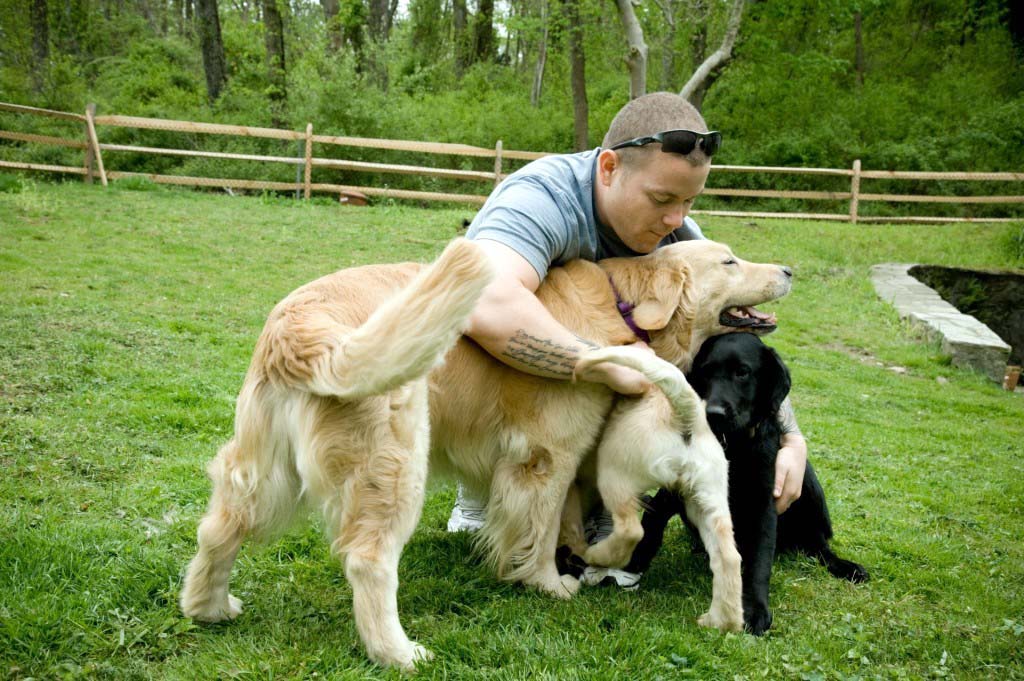
WARRIOR TRAINER: Warrior Trainers engage in the therapeutic mission of training young dogs to become Service dogs for veterans with disabilities.
Training centers are located in the Asheville area and in Hendersonville at the Veterans Healing Farm. This growing program is seeking volunteers on two fronts: as Puppy Parents who foster retrievers until approximately two years of age, and as Warrior Trainers who learn to train the young dogs under the professional supervision of WCC staff members.
I was privileged to observe one such training class at Groce United Methodist Church in Asheville and to speak with volunteers working in these two vital training capacities.
Puppy Parents: Giving Back to Veterans
Canines begin their journey to become service dogs for veterans with disabilities at the WCC Puppy Enrichment Center in Maryland. During the first eight months of the puppies’ lives, they are placed with puppy parents across the country — civilian volunteers who spend several months socializing the dogs, a critical step in their training.
Long-time puppy parent Robin Martin describes the process. “The whole basis of Warrior Canine Connection is volunteering,” she explains. “Puppy parents are volunteers who want to give back to veterans.
“The pups become part of our home. We help socialize them, taking them to the grocery store, doctors’ offices, Home Depot. We get them used to riding the trollies at the Biltmore and adjusting to large groups of people. We have a set of rules to follow, but it’s not difficult. We keep the dogs safe. They don’t run loose, they’re always on leashes or a long lead if we hike.”
Area puppy parents train their youngsters once a week with WCC staff trainers, Amy Guidash and Michelle Tate. “We’re taught the different commands so we can continuously reinforce them with the puppy,” Martin notes. “My current puppy, Mark, and I also work at home several days a week. For example, I’ll drop my keys while walking through a grocery store. He’ll pick them up and hold them for me. He picks up credit cards or coins if I drop them, in case I can’t bend over to do it myself. He’s learning the kinds of things he’ll eventually be required to do.”
When asked how she’s able to return a dog after months of companionship and training, Robin’s eyes fill with tears. “It’s hard,” she admits. “Mark is dog number 28 for me. Every time I say goodbye, I still cry. But I get to see what a difference that dog makes in the life of a veteran. That’s what makes the tears worth it. I’m not giving the dog up. I’m passing the dog forward.”
Warrior Trainers, a Soldier’s Story
At about age 8 months, while still living with their puppy parents, the well-behaved, socially adjusted retrievers embark upon the next phase of their journey: working weekly with recovering veterans at one of Asheville’s WCC training centers.
While training canines to become service dogs for veterans with PTSD, disabilities, and brain injuries, U.S. Army veteran Matthew “Matt” Estridge found his own life turning around. Before beginning his story, Matt speaks quietly to Joy, the Labrador Retriever he’s been training. Upon command, Joy settles under Matt’s chair, lying quietly between his feet until she’s released.
“I served in Iraq for two 14-month deployments,” he explains. “I had a lot of close calls and was badly injured when my tank exploded on a combat tour in 2007. After I got blown up, I decided it was time to get out. I started working at a manufacturing facility — every day trying to cover up what I was going through. But one thing led to another and I couldn’t hide it any more. They told me I was having panic attacks and I said, ‘What’s a panic attack? How do I control it? Will it go away?’”
Learning of Asheville’s new WCC program, Matt decided to volunteer as a Warrior Trainer. “It was a way for me to give back to other veterans,” he notes. However, Matt’s desire to work with dogs was thwarted by his PTSD. “When I first started coming here, there were days when I couldn’t get in the door. I’d just sit in my truck in tears, or send a text to Michelle that I was having a rough time.”
Matt’s students became his life teachers. “I came in here wanting to work with dogs to give back to other veterans. But then my first dog, Arliss, started checking me, making me change my posture when I sat. Settling me when he noticed I’d been holding my breath. Little things to help me calm down.”
Matthew persevered and as he worked with the dogs, he formed close relationships with Amy, Michelle, Robin and the other training veterans. “The class began to feel like a family,” he says. “I still have hard times coming in here. Like today, I was ramped up. But working with the dogs helps me understand and vocalize my anxieties.”
WCC staff member Amy Guidash describes her approach to warrior trainers experiencing anxiety. “I tell them to let me know if they need a minute. Sometimes, I’ll just say, ‘Come on over and sit down. Help your dog calm down a little bit.’ I don’t tell the veteran to calm down, but settling with the dog has that effect.”
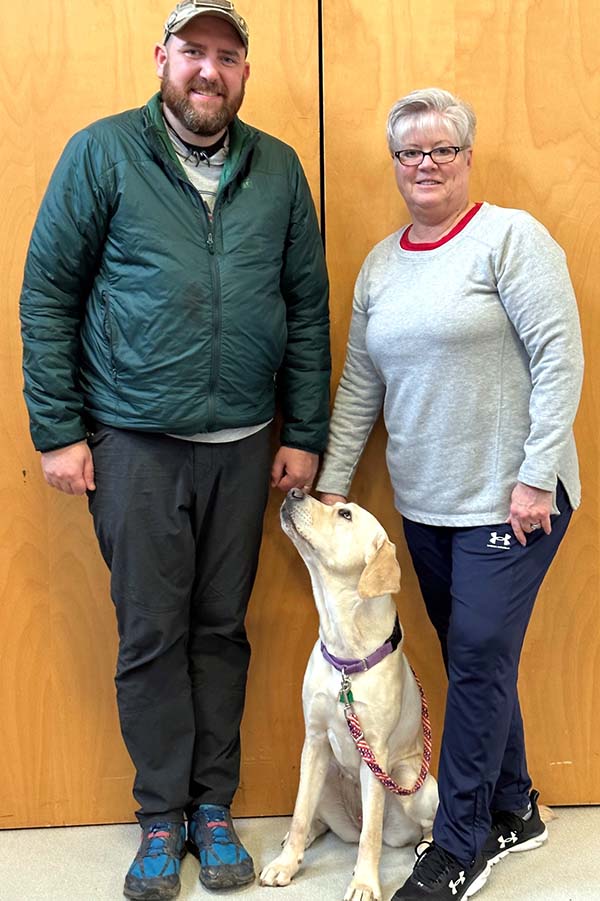
Volunteers like Matt Estridge (Warrior Trainer) and Robin Martin (Puppy Parent) are the backbone of WCC. As trained, WCC’s “Joy” keeps her eyes on her trainer.

Coast Guard veteran Ian offers WCC’s “Bryce” a reward for a job well done.
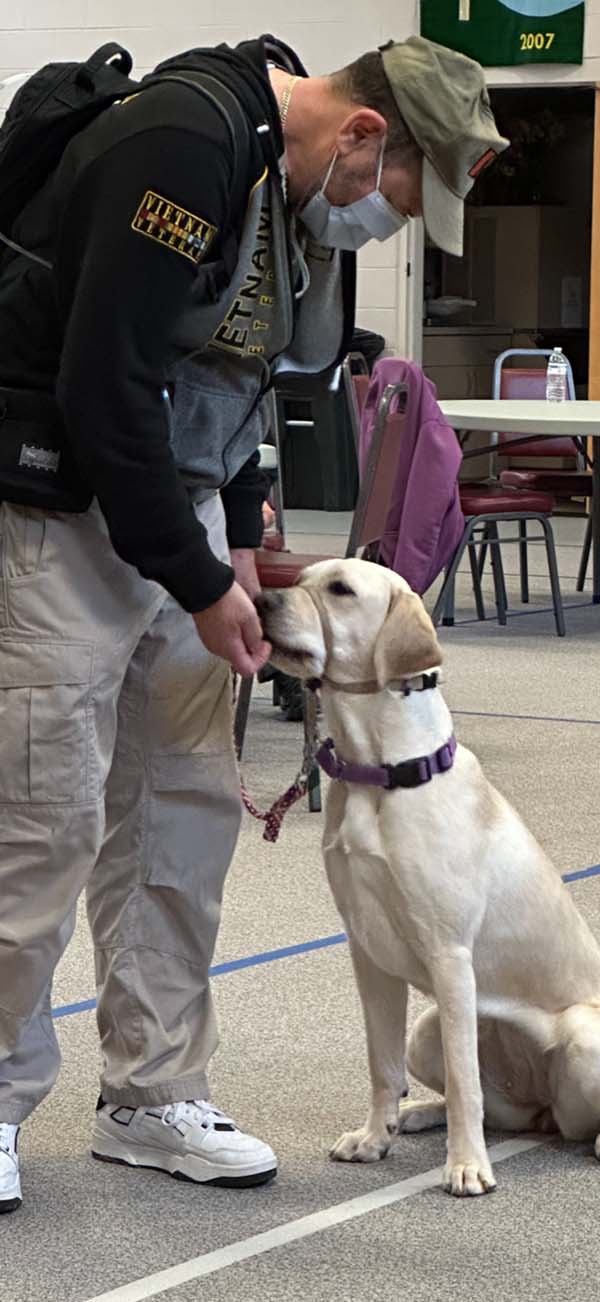
Vietnam War Army veteran Johnny Martinez rewards WCC’s “Mark” who ignored food on the ground when instructed.
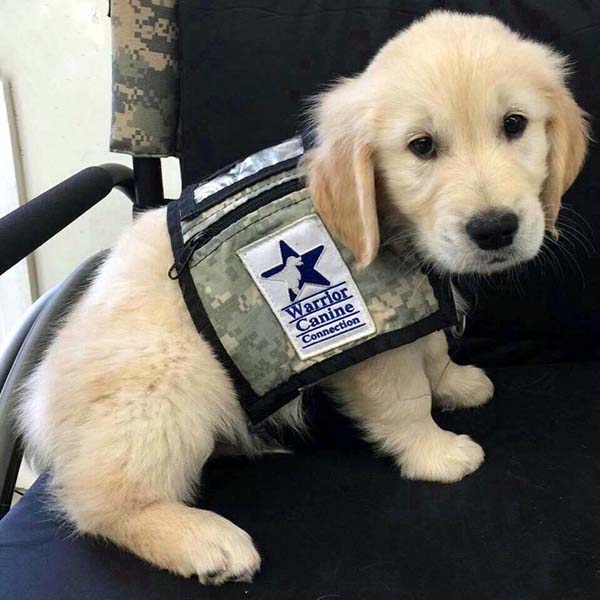
WCC “SMITH”: From birth to final placement with a “forever veteran,” each WCC dog touches the lives of 60 veterans.
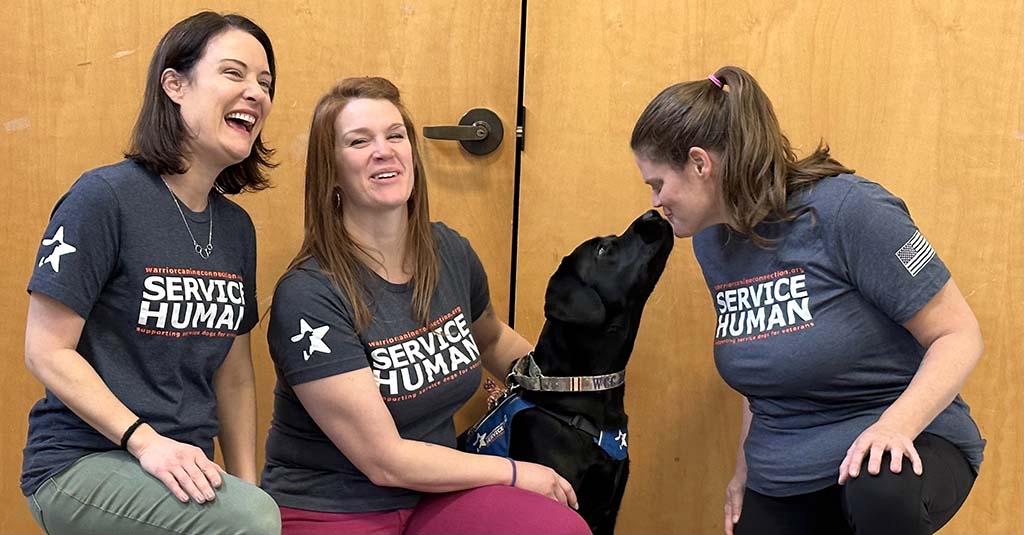
AMY AND GANG: WCC staff members (L-R) Amy Guidash, Michele Tate, and Sarah Moffitt enjoy a break in training with WCCs “Bryce.”
The human-animal connection is amazing
Warrior trainers also work outside the classroom. According to Matt, this experience helped transform him. “Because of PTSD, often when I go outside I try to be invisible. I’m on a mission. But with these dogs, it’s impossible. It’s hard for people not to see me. The human-animal connection is amazing. The dogs can see what’s going on inside of you, and help you. I became more confident and relaxed in public.”
For Warrior Trainers like Matt, recovering from their own psychological injuries, training a service dog for a fellow veteran provides a valuable opportunity to reintegrate into civilian life. As part of their training, warriors have the responsibility to teach the dogs that the world is a safe place. Through this process, they must convince themselves of the same.
Matt recently completed applying for his own service dog. He’s looking forward to the day he has his lifetime partner. Meanwhile, he continues his own recovery while helping others. “I know these dogs are going to change veterans’ lives.”
When they’re approximately two years old, after enhancing the lives of so many along the way, the retrievers return to Maryland for Advanced Training and final placement with their “lifetime veterans.” According to WCC, from birth to final placement with his or her lifetime veteran, each service dog helps the lives of 60 warriors.
You can help – Volunteer!
To learn more about Warrior Canine Connection, Puppy Parenting, and Warrior Training programs, or to volunteer, please contact Amy Guidash at aguidash@warriorcanineconnection.org. Anyone is eligible to become a puppy parent, and veterans and/or their family members are eligible to help train impressive dogs like Mark and Joy.
Top photo: WCC’s “PATTY” is one of many Labrador and Golden Retrievers assisting veterans in their journey of recovery from visible and invisible wounds.
Article by Michel Robertson
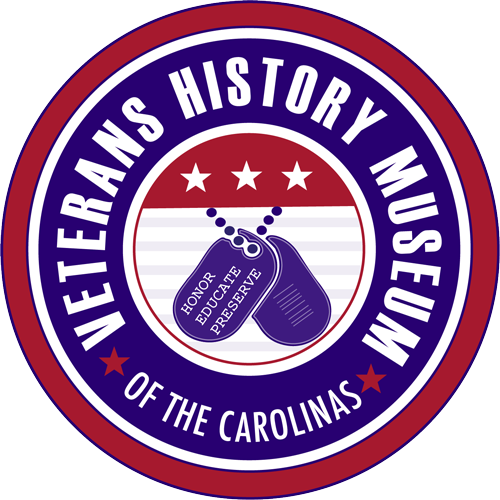
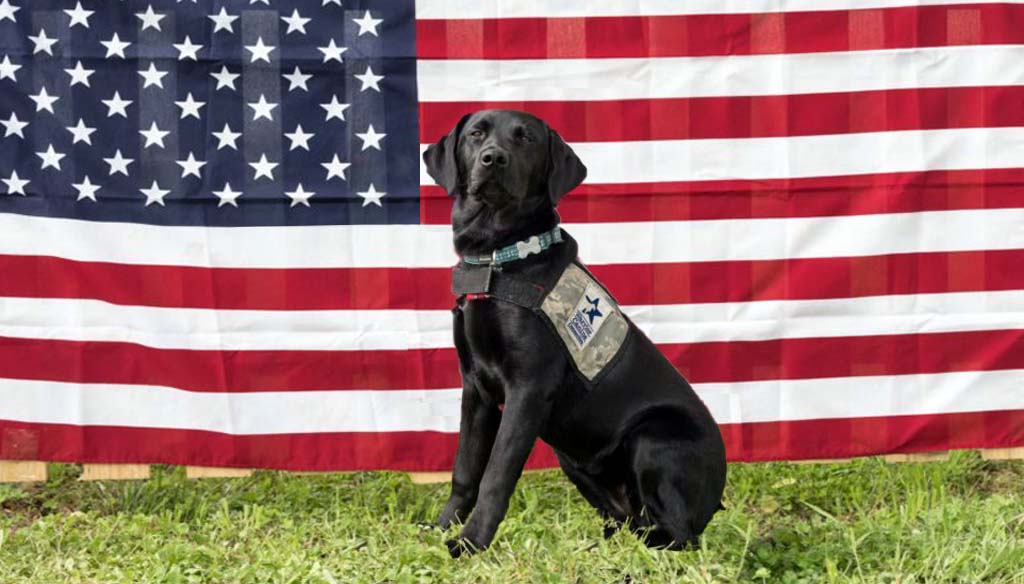
volunteering with WCC, it’s the best program and rewarding experience I ever had a chance to work with. It’s beyond words explaining how I feel when training with these wonderful dogs and trainers. They devote there time and life, helping us more then anyone can imagine. Amy, michele. Sara. God bless them always, and girls thank you for your service.
And a special shout out to Robin Martin ( puppy parent ) here’s when the future service dog starts it very important life. On the way of becoming a life saver to one, who serviced this wonderful Country. Thank you, Robin.
Thank you for your comments, Johnny. I know how meaningful this experience has been to you!
What a great story! Michel, you didn’t tell me you were writing this! I’m going to post to social media right now! In the future, I would like to shoot a video.
So nice to see this devotion to our troops – thanks so much – those doggies work hard too!!